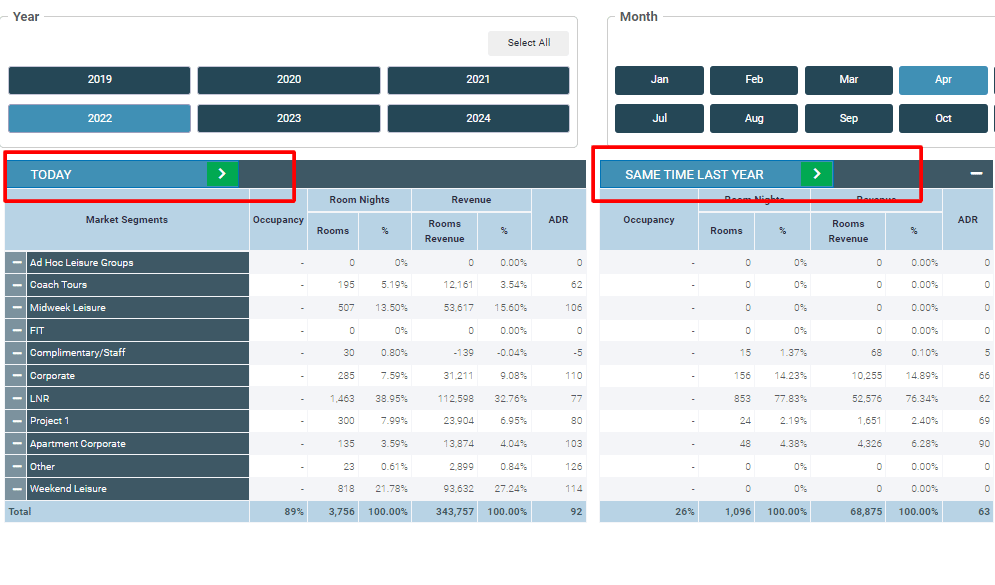Revenue meetings are essential to ensuring a business can be as successful as possible.
Collating data can be time-consuming but an essential part of a revenue manager’s job description, they need to review lots of up-to-date data to ensure they can make quick and effective decisions. Preparing for a meeting should be a painless process if you have all the information at your fingertips. Following the same format on a reoccurring basis will ensure your meetings are information-packed and effective.
Here are our 7 tips:
1) WHO SHOULD ATTEND?
We recommend all the key decision-makers are present and all those that can add to the quality of the meeting:
- General Manager
- Sales Manager
- Digital Marketing Manager
- Front Office Manager
- Reservation Manager
2) SET A START AND END TIME
Keep to the schedule, irrespective of who is missing. Make the meeting a re-occurring invite to ensure you don’t waste valuable time coordinating diaries each week.
3) PREPARATION IS KEY
Be prepared, and have all your data ready and analysed prior to the meeting commencing. Be sure to follow the same format at each meeting.
4) FREQUENCY OF MEETINGS
We would advise both weekly and monthly meetings. Weekly should be more detail on the immediate 7 days past and future months. Whereas we would recommend monthly meetings should be more strategic.
5) WHAT TO COVER AT EACH MEETING
Weekly meetings should cover:
- Pickup for the past 7 days
- Business on the books for the current month and next month
- Pace for current and next month
- Focus on market segmentation pickup, pace, and risks
- Can we optimise performance by a shift in market segmentation
- Revised forecasting for the next 3 months versus budget
- Review of competitor shopper data, questions to ask; Are any competitors closed out, or have a minimum length of stay in place, how is your rate positioned compared to the marketplace?
- Do you have any opportunity to flex your transient rates to meet your changing demand levels
- Key dates performance & price review
- Channel Analysis review, how is the pickup and pace. Can we optimise revenues on busy nights by restricting OTA performance in favour of lower-cost own website?
There are tools on the marketplace to help pull all of this data together so you can avoid manual imputing and recording of data. Our Business Analytics Tool is easy to use and uses real-time data. It records business on the books, budget, same time last year (pacing), and final figures last year for all future months – plus all historic data by market segments. Having an easy-to-use tool saves time and can help revenue managers make effective decisions & implement them quickly.

Monthly meetings should cover:
- Last month’s performance and learnings
- Business on the books for the current month and the following 3 months.
- Pace for current month and following three months
- Focus on market segmentation pickup, pace, and risks
- Can we optimise performance by a shift in market segmentation
- Revised forecasting for the next 3 months or a longer range forecast if required
- Displacement analysis; a review of segmentation and identify if any lower rate segments are displacing higher-yielding segments (example: Groups v transient corporates or leisure)
- Sale by room types, do you have any opportunity to increase your room type price supplements
- A review of own website (OWS) performance, pace, and trends
- A strategic review of packages on OWS & taking into account pacing and business on the books. Do you need to continue with discounted packages? Can the percentage discount be reduced? Can the lead-in time on APR rates be amended to enable the hotel to yield more?
- A review of your top OTAs performance, pace, and trends
- Market analysis performance (STR or similar). What is your ranking on the indexes, What are the opportunities to grow your rate based on these learnings? can we push the rate higher on any day of the week based on these learnings?
- Future demand, what are your future demand trends on STR (Forward Star if available for your city) or OTA extranets (for example Market insights on Expedia). Is your hotel pacing in line with trends, and what actions can be taken as a result?
- Reputation performance
- Account production review for top companies versus last year or the previous month
- Group/Block performance. Are you actively washing groups early enough in the booking window, to open up space for transient sales?
6) RECORD THE ACTIONS TO BE TAKEN
Appoint someone to record the action plan and who is responsible.
7) SHARE THE NOTES AFTERWARDS
Bullet point to keep them brief. Collating & recording information can be the hardest part for a revenue manager, Rate Wise has tools to help with this process, for example, our Business Analytics tool records Same Time Last Year data/Pacing data for all future dates by market segment. Giving you time to analyse data and make effective and quick decisions rather than data imputing.

If you would like further information, please reach out to the Rate Wise team at [email protected]



